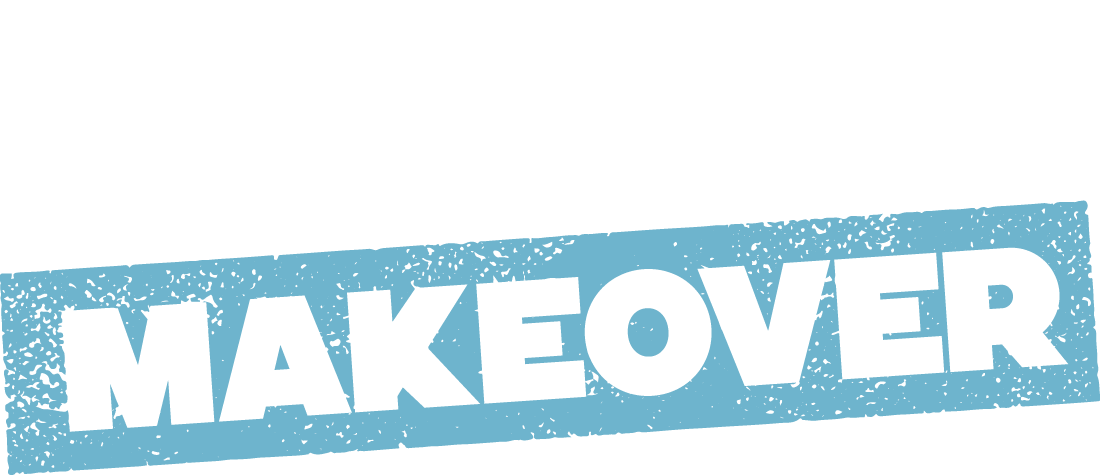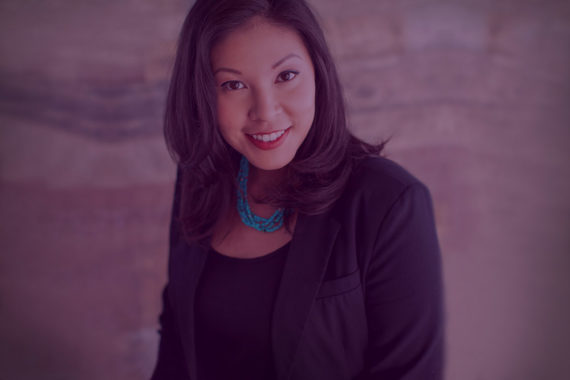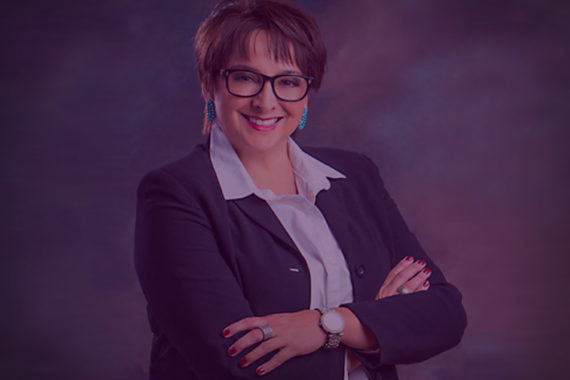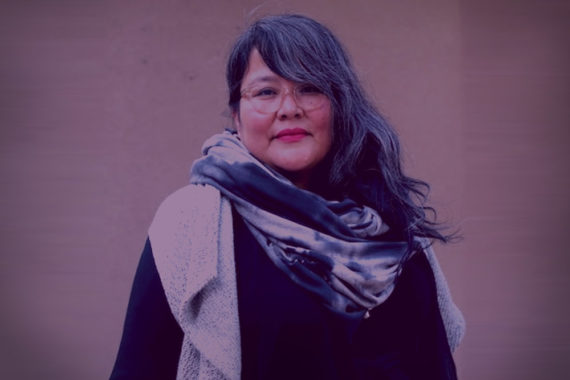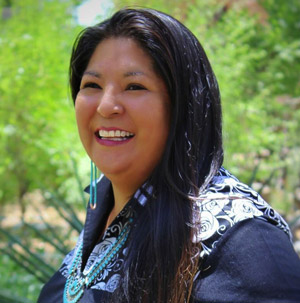
Shayai Lucero of Earth & Sky Floral Designs
Welcome to a special season of Pitch Makeover, recorded at the Native Women’s Business Summit. In this episode, Natalia is joined by Shayai Lucero of Earth & Sky Floral Designs, who blends her floral creativity with decades of business experience to foster deep connections and mentor new generations of reservation-based entrepreneurs. Shayai travels up to 100 miles to be a part of key moments in people’s lives. A floral truck would allow her to take her designs where customers need them, while keeping her family close. Plus, Jaime Gloshay joins us for the Investor Take.
EPISODE TRANSCRIPT
Gina: Welcome back to a special edition of Pitch Makeover, recorded at the Native Women’s Business Summit. I’m Executive Producer Gina Delvac.
Here at Pitch Makeover, we’ve introduced a land acknowledgment practice thanks to Anisa Flowers, who is Woodland Cree, and Chief of Staff at Pipeline Angels.
The Native Women’s Business Summit was held, and these episodes were recorded, on Pueblos land, known as Albuquerque due to white colonizers. To learn more and find out whose stolen land you’re on, search for the Native Land app.
We’re grateful for Anisa in guiding this land acknowledgment, which we’ll include in this special edition and future seasons of Pitch Makeover.
Natalia: Hey everyone! It’s Natalia, host and creator of Pitch Makeover. I am back in Albuquerque and continuing to feature Native Women entrepreneurs I got to meet at the Native Women’s Business Summit and today with me in the studio is Shayai Lucero from Acoma and Laguna Pueblo. Thank you so much for coming!
Shayai: Thank you for inviting me.
Natalia: Shayai is the founder of Earth and Sky Floral Designs. Are you ready to pitch, Shayai?
Shayai: Yes I am!
Natalia: Okay. Ready? Set? Go!
Shayai: As a Native American florist, we are a very rare and um… career. But I serve a number of communities, businesses, and organizations. Many of my customers are considered rural and require me to travel distances. Actually one of my shop’s model is: Have Flowers, Will Travel.
So I’ve always had this crazy idea of outfitting an RV as a traveling floral shop. It would have a working floral cooler, work space, and most importantly living space because I usually have my family with me. It would also allow me to travel to areas that are underserved for floral services such as on the Navajo reservation. People are pretty astonished that I will look for a home out in the middle of the Navajo reservation just to deliver a sympathy arrangement and a lot of our Native population would like to have floral services in everything from sympathy to everyday to other special events and occasions like graduations, receptions, or weddings but they don’t have a florist willing to do that or willing to travel.
And so I would love to have an RV outfitted that way I can go to the event and work on site. Kind of like instead of a food truck, it would be more like a flower truck and this is kind of an idea I’ve had since I opened my business nine years ago.
Natalia: Thanks, Shayai. So one minute and forty-seven seconds.
Shayai: Oo…okay.
Natalia: [Laughs] So –
Shayai: I know where I could probably cut it.
Natalia: Yeah. Well before we start cutting and doing things –
Shayai: Okay.
Natalia: I just want to have a conversation with you. I love that you did the, you know, instead of a food truck a flower truck in the sense of, like, you’re getting people to start thinking about what it could be, right?
Shayai: Mhm.
Natalia: My one thought was, like, when you said flower truck, though, I immediately thought, you know, “So what?” And the reason I’m saying this is because I actually have what people would call insider information. I know that you are part of an exhibit right now, right?
Shayai: Yes.
Natalia: So share a little bit more about that honor.
Shayai: I am one of fourteen Florists that was asked to – or actually received an invitation to be part of a special floral show at the Albuquerque Botanical Gardens. The show is in its third year and last year was my first year with the invitation. As a Florist we’re asked to create an installation piece that would showcase our creativity and something we don’t normally do every day.
So this year’s theme was pollinators and I chose bats as my pollinator. And bats are important to the Pueblo people. It’s in our imagery of our pottery from my ancestors. We see them as important animals because not only do they do the pollination of the evening flowers that bloom in the late dusk but they also help control the mosquito and other insect population. And so to Pueblo people they’re not bad creatures they’re actually kind of honored or revered. So they’re not a bad omen as people, kind of, try to portray them in mainstream media.
Natalia: And the reason that I wanted to highlight that was first of all because I think it’s so cool and I’m so proud of you. I think you also said you were the only Native florist in the show, right?
Shayai: Yes.
Natalia: Which, once again, yet another place that we need, you know, to get more diversity and inclusion. The other reason that I wanted to just highlight that is that this truck is not just about the flowers.
Shayai: No.
Natalia: This truck is about you and the flowers.
Shayai: Yes.
Natalia: And in some ways I feel like you’re selling yourself short, right? Like, just saying that it’s, like, a flower truck because it’s so much more than that. Right? So.
Shayai: And I get really honored when people ask me to come to them to do flowers. For instance, a friend of mine, she is a PhD student, she’s a Navajo PhD student at Texas Tech in Lubbock and her grandmother passed away and she said, “Will you be able to do the flowers?” And her grandmother’s funeral was in Shiprock which is, you know, three hours away from us.
And I said, “Yeah, I will do them.” And she says, you know, she would share photos of my floral designs with her grandmother. Her grandmother loved them.
So in a way it was me being honored for my creativity and the amount of emotion and what I put into each floral design is why, you know, my friend chose me to help honor her grandmother at her grandmother’s final life tribute and to me, I think, my floristry, kind of, is… makes me different because of the emotion and the thought I put into each of my designs. Even something as, you know, simple as a so-called everyday design that a florist may turn out, I always try to put a little bit of creativity or a little element of surprise into each design just so that it stands out so that you know, “oh I got that from Earth and Sky.” Just a little touch. I guess that’s what I really want is to take my mobile – my services mobile and travel to where I am needed.
Natalia: And I actually – I love your tagline. You said: “Have Flowers, Will Travel.”
Shayai: Yes.
Natalia: It’s because you are actually explaining what you’re doing for someone who – you’re mentioning all of your clients are in rural areas. It’s kind of like you’re already saying, “Don’t worry! I’ve got you. I’ll be there.”
Shayai: Yes.
Natalia: I’m also figuring that getting this truck will probably be more – help you scale and longer term it’s going to be more affordable –
Shayai: Yes.
Natalia: —than whatever’s happening right now, right?
Shayai: Yes. And our delivery radius is about 100 miles. So even if people say, “Oh you deliver all the way to Albuquerque?” Well to me 45 miles is not a huge distance but for somebody who is city-related that’s, you know, that’s a long distance. So I guess that’s what makes me different is that I know how it is to be a rural New Mexican and how it is to be on the reservation and having to navigate res dogs and dirt roads and all these other obstacles that a regular florist wouldn’t have to navigate just because my customer base is so unique.
Natalia: The other thing that you just mentioned which I think is really important was the delivery radius. I think that, you know, you’re giving someone that understanding. Also I mentioned the exhibit that you’re part of.
Shayai: Yes.
Natalia: Congrats on that. What sort of other recognition, or exhibits, or honors, or awards have you gotten? Because I get a sense that there might be a few more.
Shayai: Yes. It’s kind of difficult for me to… as Pueblo people we’re supposed to remain humble, but since you’ve asked the question I’ll tell you what I’ve done. I was recognized by the international floral industry for a wedding bouquet I designed. I created a floral design in collaboration with another Native American fashion designer for the Indian Market Clothing Contest. She created a wedding dress that was based on her traditional clothing of the Gila River people and she wanted me to have a wedding bouquet designed for it.
So I did some research about the Gila River culture and then I combined it with some of my Pueblo culture beliefs because we have a reverence for flowers. Flowers attract the pollinators. Flowers are very important in our culture. And her people in their basketry and in their pottery there’s floral designs. In my Pueblo people in our basketry and our Pueblo pottery are floral designs.
So what I did is I kind of combined – I blended the two Native American cultures and I created a wedding floral bouquet and made it out of wire, took these different elements to it, and I submitted the photograph of it to this contest and so there was a popular vote, there was also an industry vote and what they do is they look at the winners of the popular vote and then the industry insiders they select. And so Smithers Oasis chose my wedding bouquet as the wedding design of 2017 and so they advertised it in industry magazines.
At that point I realized, well I am good at what I do and so it really, kind of, made me feel good about this career path that I’ve chosen because I’m not a professional – not a trained florist. I didn’t go to school. My background is in biology with a minor in chemistry, so I’m a scientific background. But what I think I’ve kind of done is I’ve taken those elements of learning about science and applying it into this career like looking for a mentor. My mentor’s from the Netherlands. That’s one of the first things I did was when I became a florist was to look for a mentor. And I reached out to a number of florists and it’s a cutthroat industry. A lot of people don’t want to share mechanics, a lot of people don’t want to share designs, or help you. And it was very lonely in the beginning.
But this designer from the Netherlands of all places, he reached out to me and he said, “Okay this is how you work this,” because I asked him about a piece that he did and so he sent me photographs of the mechanics behind it and I’m like, “Oh my gosh somebody is sharing!”
And so I started doing a little bit more creative things to my floral designs and it’s turned tables where now he’s asking me, “How did you do that?” and so it feels really good to gain that type of recognition as well.
Natalia: That’s so powerful, Shayai. I’m also thinking – you know, in terms of this truck – what else could happen and when you were talking about learning… are you interested in having, like, workshops, you know, out of that truck to teach people? Or are you interested in maybe – are you creating jobs? Is it you? Or do you hire other people to help out?
Shayai: Well the past few years when I did have a storefront – I had to close the storefront because my father in late stage renal failure and he is on the transplant list at UNM and at Mayo Clinic in Phoenix and so he’s active on the transplant list and if he – we get a call that he needs a kidney we need to leave almost immediately, especially if we’re driving. And my brother and I had timed it that from the minute we got that call to close the storefront, get everything in order for us to be closed for a period of time, it would take us at least 45 minutes and that’s 45 minutes that is being pulled away from my dad, and I can’t afford that. My dad can’t afford that. So I closed the storefront and I’m now a home-based floral studio and I live right next door to my parents.
So right now if I get this floral truck not only, like I said, I would have my family with me, my dad would be with me. If we need to leave we can just haul away in, you know, flowers and all if we need to, to get him to whatever destination the kidney would be coming.
And so it’s a lot of my business is centered around family. You know, because I closed the storefront the previous years every summer I would hire youth workers from our tribal summer youth program. And I would teach them about everything from having to properly wash buckets because not many people think, “Oh I’ve got to wash buckets.” But if you’re not washing your bucket properly it could start breeding bacteria so there’s different ways that you, you know, have to wash the buckets. Things like keeping the store clean, helping me design marketing materials, the different basic business elements I would start teaching the youth workers before we delved into floral design because I think that’s really important that you teach an entrepreneur about the facets of business before you actually want to do business. I didn’t do that. I didn’t get that and I suffered greatly in the beginning of my business because I didn’t have those facets of business taught to me.
So for me it’s really important that if I’m going to bring on a summer worker that they’re not going to just be “playing with flowers.” They’re going to have to want to learn about the business aspect of it before they get to play or work with the flowers. And then we when we do work with the flowers I also teach them about the respect for the flowers because for me those flowers, they grew somewhere, they came from our mother, and they’re coming to us. So I teach them that whenever when we do go to the wholesaler or the farm direct-shipped or wherever we get them from, that we welcome them to Laguna or to Acoma. So before they’re open I always tell them “Welcome to Laguna!” or even when we’re designing I’ll tell the flowers, you know, “Work with me! You’re going to – you’re in someone’s wedding bouquet,” you know. Or, “You’re going to be going with someone on their final journey.”
You know, so I talk to the flowers and my summer youth workers probably thought I was kind of crazy but there’s a young man that he started – when he worked with me that summer he says, “Now I know what you meant about respecting the flowers.” So he started his own business but he’s in photography, a completely different aspect, but he says, “Thank you for teaching me about those business facets because now I know what to do when it comes to business. I didn’t necessarily, you know, go into floristry, I’m in a different creative aspect.”
But for me, I think that’s really important and I would love to try to teach somebody out of my truck because I learned from my floral designer that I – she says – I inherited when I bought the business and she’s the one that taught me. And so I feel it’s important that I need to go and teach somebody else as well.
Natalia: I love that and I can totally see how, well, number one: the fact that you are providing this Business 101 that, guess what, is applicable across industries and across professions and you added so much value to that person so congrats on that, Shayai.
Shayai: Thank you.
Natalia: And then the other part that I would say is obviously my thoughts are with your father and your family.
Shayai: Thank you.
Natalia: You know. And you mentioned that your background is in biology.
Shayai: Yes. And a minor in chemistry.
Natalia: So I was curious because I was like oh does the biology actually help you in terms of knowledge regarding…
Shayai: I think that –
Natalia: …flora?
Shayai: Well, it does help, but I think my main interest in biology stems from wanting to go into medicine. My whole goal was to become a doctor. I had some things that happened in my life that prevented me from getting my degree. I had problems with the scholarship I was on that had to be remedied through the legal system and that took seven years. Once it was remedied, I found out I was pregnant. I wasn’t going to raise a child going through medical school. So I chose to put off medical school as a career. But then in reflecting back on that time and then, you know, my school goals and my education goals, I still decided I want to still pursue biology but I’m going to go on a different route. And so, I’ve been studying the medicinal plants of my people since I was twelve years old, and I decided to also hold off on my college degree to study Curandismo medicine for a year with Curanderos and healers from Mexico. My mother and I actually did this together and we earned our certificates in traditional Curandismo medicine and it’s a joint certification with the University of New Mexico, the University of Mexico in Morelos, and in the La Tranca School in Cuernavaca. It’s a joint degree and it’s recognized by the United States and Mexico that you’ve studied this. And so my – when I did open the floral shop, one of my goals in the beginning was the also add on the medicinal plant knowledge to teach people about homeopathy, to teach about medicinal plants.
And so in a way that biology degree, even though it may not seem… I guess useful as a florist, it does – it has helped me in terms of, one: looking for a mentor, in terms of the different discipline methods that you have to undertake when you’re studying a scientific degree. And so I’ve kind of applied those into this floral business and then also in terms of learning about business. Like I was telling my mom, I said “I’ve had so many blood, sweat, tears, and vomit over this business.”
But to me it’s like, my own experiment. When you do something in the lab, it may not go according to plan then you just tweak it a bit and you try to figure out, “Okay how am I going to tweak it enough so that I’m going to get the results that I want?” And it’s taken nine years for me to get things tweaked enough so that I can actually be proud and accept that recognition for what I do. So it’s my nine year experiment, basically, is how I see this floral shop.
Natalia: Shayai, are you ready for your Pitch Makeover?
Shayai: Okay.
Natalia: And so I want you to keep the customers, you know, that who your customers are: rural.
Shayai: Okay.
Natalia: You know, your tagline: Have Flowers, Will Travel. I want you to keep why you need the RV traveling shop. Focus on the business reasons. And I want you to add the delivery radius you mentioned, the 100 miles, because it’s a very – it makes it very explicit and very tangible how the RV is going to help you and also add the recognition you got in September, the international floral industry, and the fact that you’re part of an exhibit of only one out of fourteen florists and the only Native florist because, you know, we need to change the ratio there. At the same time thank you for representing. “Why you?” you know, answer that question. And then I would say bring up that – there are at least a couple of other revenue streams in addition to selling flowers, flower arrangements specifically, right?
Shayai: Yes.
Natalia: Because that’s what you’re adding value. It’s not just you’re selling flower arrangements.
Shayai: Arrangements; designs. Yes.
Natalia: Exactly. Which we need to underscore. And then the other two potential revenue streams that have come out from our conversation is how you’re teaching and these workshops and that potentially you’re teaching Business 101 through flowers. At the same time people can then – as that, you know, student of yours showcased – these lessons, these business lessons, you’re providing are applicable across industries and across professions. So that’s one of the potential revenue streams you have. And the second one is medicinal plants, you know? That’s another revenue stream that, you know, you have and that means the potential to grow even more because we’re talking about three different products that you have.
And then in terms of delete, I still think unless you clarify, you know, how you’re more than just flowers – although flowers are amazing and I’m glad you’re honoring them – and you’ve given me, you know, new insight and a better appreciation for flowers which I will take with me. I would say saying comparing yourself to a food truck is almost like you’re forgetting to include the word, you know…you’re saying “flower” and you’re not saying “arrangement,” you’re saying “design” and that’s where you’re adding value.
Okay, so are you ready for your…
Shayai: My pitch?
Natalia: Yeah, for the pitch do-over? Okay. Ready? Set? Go!
Shayai: As a Native American florist, I serve a number of communities, businesses, and organizations within a 100 mile radius. Many of my customers are considered rural and require me to travel. Actually, one of my shop’s models is: Have Flowers, Will Travel.
I would like to outfit an RV to become a mobile florist. The RV would allow me to get to customers quickly, it would also lower my business cost, and increase my margins. Customers choose my shop based on our creativity that we put into every design and arrangement that comes out. I was recently recognized by the international floral industry for a wedding bouquet I created. I was also recently selected as the only Native American florist to create a floral art piece for the Albuquerque BioPark Floral Show. In addition to having – being a mobile florist, the RV would allow me to teach basic 101 business methods to any inspiring or budding entrepreneurs. But in addition to my love of flowers, I’m also a practitioner of medicinal plants. So I would be able to not only do floral design, but I could maybe possibly conduct workshops regarding the use of medicinal plants, how to use them in their own healing. But as Earth and Sky we need our flowers to come to you.
Was that better?
Natalia: It was one minute and thirty-three seconds.
Shayai: That was…okay.
Natalia: How did it feel the second time around?
Shayai: It felt better, yes…to just, kind of, like, focus. To be able to focus. The feedback is really, really important to me because I – [in] comparison to some of the women there at the Business Summit, I kept thinking, “I’m just a florist.” And my dad always tells me, “Don’t ever think you’re just anything.”
You know, at the beginning of the Summit I’m like, “I was just a florist,” but at the end I’m like, “I am THE florist.” It was – and to be able to talk to you and get that, kind of, feedback from, you know, somebody who knows what investors and how I could possibly get access to capital, you know, what they’re looking for. That helps me focus because I have a tendency to go off on a tangent.
It makes me proud to say, “I am THE florist.” Instead of saying, “Oh I’m JUST a florist,” I’m now “THE florist.” I’m “THE Native American florist” and being at the Summit made me glad and made me proud to be me and I think that was what was really needed for me and a lot of our Native sisters is that we have to be proud to be me. And we don’t get that very often.
Natalia: You came up with this episode’s Pitch Makeover Tip which is: be proud to be me! Maybe it’s like, be proud to be you. So that we can share it with our audience, etc. And the two things that –
Shayai: That made me cry!
Natalia: Aww! It’s… you’re speaking truth. You know?
Shayai: It’s so hard to be you. It’s really hard for Native American women to be ourselves just because we overcome so many stereotypes and so many things, it’s just… it’s difficult to be us, to be me. But thank you! And these aren’t tears of hurt or whatever. These are…wow…thank you.
Natalia: This was the Oprah episode.
Shayai: [Laughs]
Natalia: This is when I know that things are going really well if I, like, I get someone to cry [laughs].
Shayai: [Laughs]
Natalia: The thing – the other reason that I love – so today’s Pitch Makeover Tip brought to you by Shayai Lucero is: be proud to be you. And the “you” I would say can mean so many things. And the “you” that I want to emphasize from our conversation was part of you…part of you…part of who you are is that person who studied biology. I love that we had that conversation about how now, even though how you went through and you studied biology and chemistry for different reasons than, like, how you’re practicing right now, there was a piece of you who decided to study that. And that piece is still in you and that piece found a way to bring that passion for biology, for chemistry, back into your present. That piece of you is helping you create another potential revenue stream. And that’s so powerful by being in tune with you. You know, like, you’re actually helping to grow and scale your business in a different way than probably you thought of when you had, like, that… right?
Shayai: Exactly.
Natalia: That start of this new career, right?
Shayai: Yes. I had no idea it was going to go the way it went. I thought I was going to be the florist playing with flowers. I didn’t think it was going to be what it’s turned into. To becoming a healer, to becoming a teacher, to becoming an entrepreneur. I never thought it was going to turn into this. I thought I was just going to just go, you know, make flowers, make money, and that was it. I didn’t think – I didn’t ever think in my wildest dreams that I would be allowed to be a part of people’s lives. And I think that’s – it’s amazing how many people allow me into their lives, a small little teeny bit, but I really have deep respect for that.
Natalia: They welcome you into their lives and I’m sure that they don’t welcome just anybody.
Shayai: No.
Natalia: So that says something about you and that’s why be proud to be you [laughs].
Shayai: Love it.
[Music plays]
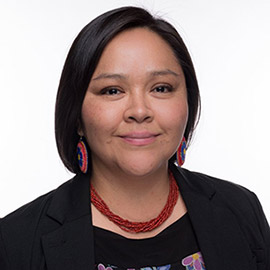
Jaime Gloshay, Loan officer at Acción and Co-Founder of the Native Women’s Business Summit
Natalia: Hi everyone, it’s Natalia, host and creator of Pitch Makeover, back in the studio in Albuquerque with Jaime Gloshay, one of the co-founders of Native Women’s Business Summit. Jaime is White Mountain Apache, Diné-Navajo, and Kiowa. Welcome Jaime!
Jaime: Thank you.
Natalia: So for today’s Investor Take, what key piece of feedback do you have for founders?
Jaime: Planning is so important. Planning and preparation is so key within our communities as we prepare for changes in our environment. Whether it’s seasons, or ceremony, or celebrating, or even death. There’s a lot of preparation that goes into it. And with a business, that would be the same.
When we started the Summit and we were planning for it, there was a lot of details that went into it. There was project management details. We had to look at things at a systems level. We had to consider all the elements. The scale we wanted. We had to consider the workload: what kind of energy, effort, time, what sort of resources could be put into it.
We also had to utilize our social capital, our network. We had to call in our families and our communities, and engage with the community and educate yourself, so that we could create a program that was beneficial to the people. And this is also something entrepreneurs need to do. They need to be able to call upon their knowledge, their education, the research, doing their market research. To really see if this is something that will work. And planning is just so important to really make a product or service that is thoughtful or sustainable.
—
Natalia: We are back in the studio with Shayai Lucero, founder of Earth and Sky Floral Designs and from Acoma and Laguna Pueblo. Shayai, welcome back! Tell me about the first time that you ever pitched. Your first, first, first, first pitch ever.
Shayai: My first pitch was to a loan company and I was looking for capital to purchase a floral shop and I went in and gave my pitch to the loan officer.
They told me, “Well we can’t fund you.” And I said, “Well why?”
And they said, “Well because you’re a reservation-based business.” And that was heart-breaking because even though I own my own home, I couldn’t use it as collateral. And, turns out, that the loan officer either didn’t like me or didn’t want to help me because nine years later in talking with a loan officer from that same company, she told me, “No, we do fund reservation-based businesses. We do fund Native Americans who live on the reservation.” And that was heart-breaking to me to discover that maybe I really didn’t have to struggle as I had done so in the beginning, but it was because of that personality difference that the loan officer maybe just didn’t like my personality or didn’t like what I was trying to pitch, and…just because of that human emotional negative response, I had to struggle.
But at the same time, I told the loan officer from that company – the current one – that maybe it was good that the negative officer had that attitude towards me because I found another company who helped give me that initial loan and who stuck by me ever since. So in the end it was trying to turn something negative into positive. But I will always remember the heartache after being told “no” and then finding out later that it could have been a “yes.”
Natalia: This is such a disappointing yet real example of – often people talk about meritocracy and actually meritocracy is a myth. You know because at the end of the day we’re talking about people. People are making the decisions and people are not objective. You know, people come with their own experiences, perceptions, biases, etc. And so for someone who’s, like, waiting to pitch because they’re, like, “the pitch has to be perfect!” Even if it were “perfect,” it doesn’t matter because there’s a human that you’re pitching to and they might have their own baggage that might then impact how they’re going to receive your pitch, whether or not you think it’s perfect.
So this is my own pitch and my PSA to be like, so if that’s how it is, then don’t wait until you feel like all the dots are –
Shayai: Exactly.
Natalia: –all the I’s are dotted and all the T’s are crossed because you’re still going to deal with a human being on the other side. Right? I try to be, like an optimist and I’m hopeful and glass-half-full, and you did mention that nine years had passed, and a part of me is, like, hopeful that maybe nine years back that had been the policy and they realized how sucky that policy was and then maybe they updated the policy and that’s why now they do provide loans to Native entrepreneurs who live on the reservation.
The other thing that I think I loved about the story is that “no” doesn’t mean “give up.” “No” means “move on.”
Shayai: Yes.
Natalia: Don’t waste your time, you got that “no” and then you moved on and you found someone else who did give you that loan and who has been – at least from what you’re saying – has been a fantastic supportive advisor.
Shayai: Yes. They have been amazing. They’ve been with me through all different aspects; changing of storefronts, changing of business models, and they’ve guided me. So I took that negative and I turned it into a positive and just try not to hold resentment to that previous organization – although it took nine years for me to step into the doors of that organization again – and then to realize that, you know, the “no” that I did receive from that organization could have been a “yes.” I had to heal from that, too. But now it’s – I think it’s nine years. I’m nine years older. I’ve learned to, kind of, learned how to forgive and move on.
Natalia: That didn’t stop you. You continued and you found –
Shayai: Yeah that door closed, another one opened.
Natalia: Yeah.
Shayai: We’ve got to keep looking for those unlocked doors no matter how many doors are locked and shut in our face. Look for that one even if it’s small, even if it’s tiny, but it’s still opening and allow that door to open and it’ll come.
Natalia: And let’s continue to work on opening even more doors.
Shayai: Yes!
Natalia: And creating our own doors that are already open.
Shayai: Exactly.
Natalia: Like the Native Women’s Business Summit. Shayai thank you so much for joining me today. It has been a pleasure to have you on the show.
Shayai: It’s been great and thank you for everything.
Natalia: Thank you.
[Music plays]
